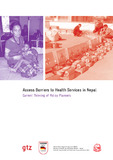Please use this identifier to cite or link to this item:
https://hdl.handle.net/20.500.14356/286Full metadata record
| DC Field | Value | Language |
|---|---|---|
| dc.contributor.author | GTZ/GFA Consulting Group GmbH | |
| dc.contributor.author | Neupane, Basu Dev | |
| dc.date.accessioned | 2012-12-28T23:46:28Z | |
| dc.date.accessioned | 2022-11-08T10:14:15Z | - |
| dc.date.available | 2012-12-28T23:46:28Z | |
| dc.date.available | 2022-11-08T10:14:15Z | - |
| dc.date.issued | 2009 | |
| dc.identifier.uri | http://103.69.126.140:8080/handle/20.500.14356/286 | - |
| dc.description.abstract | Background A number of operational studies have indicated that people in general and poor people in particular in Nepal are facing various barriers in accessing health services. In response to this, the Interim Constitution of Nepal has recognised health as a basic human right and the government has introduced many programmes aimed at removing such barriers. Prevailing views of policy makers areimportant in removing the access barriers to health services. This study aims to assess there levance of operational studies on health policy formulation and to capture the current thinking of policy planners on access barriers along with their suggestions for removing these barriers. The study methodology rests on in-depth interviews of 26 (22 male and 4 female)policy planners, and a review of selected operational studies. | en_US |
| dc.language.iso | en_US | en_US |
| dc.publisher | GTZ/GFA Consulting Group GmbH | en_US |
| dc.subject | Access Barriers to Health Services in Nepal | en_US |
| dc.title | Access Barriers to Health Services in Nepal | en_US |
| dc.title.alternative | Current Thinking of Policy Planners | en_US |
| dc.type | Technical Report | en_US |
| Appears in Collections: | Post Graduate Grant (PG) Reports | |
Items in DSpace are protected by copyright, with all rights reserved, unless otherwise indicated.

